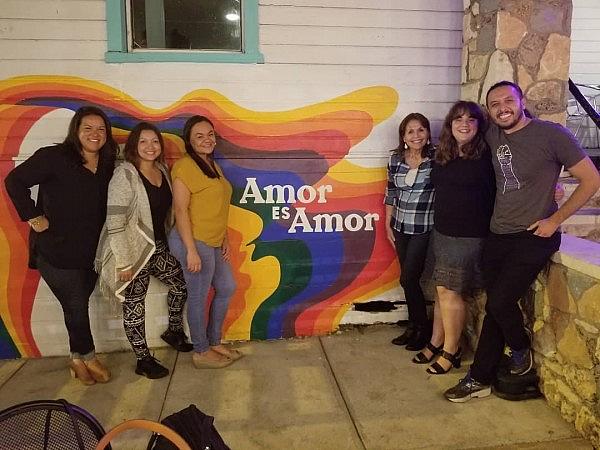Pioneering study on how the pandemic affects the mental health of Latinos
This story was produced as a larger project by Valeria Fernandez for the 2020 National Fellowship, focusing on how indigenous, immigrant communities and people of color have been organizing before and during the pandemic in communities of care to find support and healing.
Her other stories include:
En Arizona, inmigrantes afectados no van al médico por temor a regla de “carga pública”
Edición Semanaria: Inmigrantes embarazadas con coronavirus en riesgo mayor de depresión
Edición Semanaria: Network of Therapists Helps Migrants and Activists with Mental Health Problems
A therapists' network supports immigrants, advocates during pandemic
Edición Semanaria: Ancestral Foods Nourish Immigrants’ Bodies and Souls this Holiday Season

Francisca Porchas Coronado in the center to the left with therapists from the Network of Latinx Counselors in Action from Arizona and Austin.
Photo: Valeria Fernández.
The Covid-19 pandemic continues to disproportionately affect Latinos. Although doctors continue to advance with physical recovery therapies after infection, little is known about the consequences in mental health. To document how uninsured Latinos are effectively dealing with depression and anxiety with traditional methods and proposing support programs, a network of therapists is conducting a groundbreaking national survey. With details from Phoenix, Arizona, Valeria Fernandez .
Maru is a 52-year-old undocumented immigrant who contracted Covid-19 and became seriously ill. Now recovered, she doesn't have the energy to go back to work cleaning houses. It depresses her not being able to pay her expenses or send money to her relatives in Mexico as she did before.
“The problem with this is that it affected me psychologically. Why? Because I can't do what I did. I'm limited because I'm tired."
This lack of energy keeps Maru from sleeping because she also cannot afford psychological support.
“These consultations are not cheap. Those queries are expensive, so where do you come from if you're not working? So what can we do who don't have health insurance?"
Although they are considered essential workers, undocumented immigrants like Maru lack health coverage. That is why in many cases like her they have had to look for alternatives. Before the pandemic, Maru went to healing groups in a community organization, but with social distancing she has now run out of options.
After African Americans and Native Americans, Latinx people have the highest rate of contagion and death due to COVID-19, according to an analysis by APM Research Lab. Scientists know much more about the physical aftermath of the pandemic but still little about the impact on mental health. To find answers, the Network of Latinx Counselors in Action is surveying more than 5,000 Latinx throughout the country. Francisca Porchas Coronado, is its director and founder:
“We want our people to be able to tell this story in their own voice, to elevate these stories so that the suffering and also the resilience of the people is known. How they are creating systems of care and systems of care outside of what the state is promoting"
Porchas says the pandemic exacerbated many existing social problems in the country due to racism and anti-immigrant policies.
"Poverty, lack of work, people who are being evicted, who cannot pay their rent ..., it is the lack of food, access to education ... "
While the pandemic has brought this inequality to light, creative solutions have also emerged from within communities across the country, but have not been documented. David Becerra, a professor of social work at Arizona State University, leads the survey.
"One of the goals we have with this survey is to provide information to social service agencies so that we have resources or programs to help people affected by the coronavirus," said Becera.
For the past two years the network of mental health professionals founded by Porchas has worked to provide these expensive and inaccessible services to poor and undocumented communities, connecting people with them and through a directory of Latinx therapists throughout the world. country.
Porchas said the survey is anonymous and participating is simple by texting the word "wellness" to number 94502. The groundbreaking survey takes about 15 minutes to complete, and covers questions ranging from the economy, to the mood of a woman. person, or their use of alternative healing methods. The poll will remain open until October 7, and both Porchas and Becerra know that talking about mental health is not easy among Latinos, and they hope to break down those cultural barriers. They also remind people that therapy can help to heal physically by regaining self-love.
"Although at the end of the day we have had so many family members and loved ones who have become physically ill for not processing, for not sharing, for not feeling worthy of receiving the care, the affection that is necessary to be able to heal."
For the Weekly Edition of Noticiero Latino from Phoenix, Arizona, Valeria Fernández.
Photo: Valeria Fernández.
This report was produced as a project of the Dennis A. Hunt Fund for Health Journalism, a program of the USC Annenberg Center for Health Journalism .
[This story was originally published by Radio Bilingue.]

